Fleurs du Mal Magazine


Or see the index
« Ce livre n’est pas un livre de deuil. Le deuil, c’est après. […] La vivacité du présent. Celle du sentiment. La trace que nous laissons aux autres. Ces particules de temps et d’affection mêlés demeurent en suspens. Ici, ce sont elles qui commandent, et avec elles, le souffle que sa mort m’a laissé au cœur. »
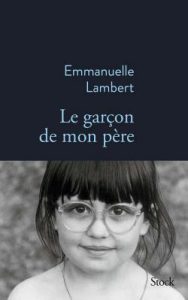
Le récit s’ouvre un dimanche de septembre 2019, un dimanche où le père « concret et nébuleux à la fois » d’Emmanuelle Lambert, se prépare à mourir d’un cancer de l’ampoule, un organe situé à la tête du pancréas.
Et pourtant, ce livre est un livre de vie. C’est que, par une douce ironie des mots, il est à l’image de ce personnage de père à la «chaleur explosive» : «rétif à toute forme de rêverie fatiguée, car dans la fatigue se glisse un effritement possible, une voie pour la douleur et le doute».
Le duo du livre-tombeau et du père illumine tout sur son passage. Il n’y a pas de gris ici, mais les couleurs éclatantes du souvenir, du mange-disques seventies aux yeux de Dalida.
Poignant et solaire, émouvant et lumineux, mélancolique sans le poids du pathos, familial et universel, le récit d’une fille raconte le père : mais le père aurait peut-être voulu un garçon.
À l’hyperactif soixante-huitard, au Dieu imprévisible de l’enfance, à l’ex-enfant triste qui joue jusqu’au bout de sa vie y compris en abordant aux rivages de la fin, répond une fille, qui se construit comme une femme. Avec une subtilité infinie, Emmanuelle Lambert traite dans ce livre de bien des thèmes, de l’intime au collectif, du masculin au féminin, et celle que son père, « le grand tonique » surnommait « Dudule », confirme l’écrivain de premier plan qu’elle est devenue.
Emmanuelle Lambert est l’auteure, entre autres, d’un roman, La Désertion (Stock, 2018), et d’un essai littéraire, Giono, furioso (Stock, 2019), couronné par le prix Femina de l’essai en 2019. Elle a été la commissaire de l’exposition Giono au Mucem, et vient d’éditer les romans et poèmes de Jean Genet dans la Pléiade.
Le garçon de mon père
Emmanuelle Lambert
Parution: 25/08/2021
Collection: Stock – La Bleue
180 pages
Format: 135 x 215 mm
EAN: 9782234090019
Prix: € 18.50
• fleursdumal.nl magazine
More in: - Book News, - Bookstores, Archive K-L, Archive K-L
New and selected poets from the
great Pulitzer Prize–winning poet
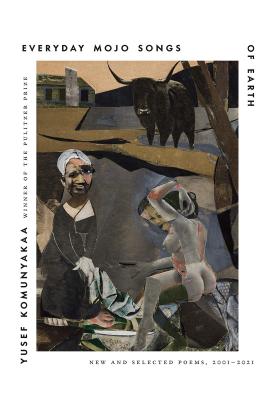
Everyday Mojo Songs of Earth brings together selected poems from the past twenty years of Yusef Komunyakaa’s work, as well as new poems from the Pulitzer Prize winner.
Komunyakaa’s masterful, concise verse conjures arresting images of peace and war, the natural power of the earth and of love, his childhood in the American South and his service in Vietnam, the ugly violence of racism in America, and the meaning of power and morality.
The new poems in this collection add a new refrain to the jazz-inflected rhythms of one of our “most significant and individual voices” (David Wojahn, Poetry).
Komunyakaa writes of a young man fashioning a slingshot, workers who “honor the Earth by opening shine / inside the soil,” and the sounds of a saxophone filling a dim lounge in New Jersey. As April Bernard wrote in The New York Times Book Review, “He refuses to be trivial; and he even dares beauty.”
These songs run along dirt roads
& highways, crisscross lonely seas
& scale mountains, traverse skies
& underworlds of neon honkytonk,
Wherever blues dare to travel.
Yusef Komunyakaa (born James William Brown, April 29, 1941) is an American poet who teaches at New York University and is a member of the Fellowship of Southern Writers. Komunyakaa is a recipient of the 1994 Kingsley Tufts Poetry Award, for Neon Vernacular and the 1994 Pulitzer Prize for Poetry. He also received the Ruth Lilly Poetry Prize. Komunyakaa received the 2007 Louisiana Writer Award for his enduring contribution to the poetry world. His subject matter ranges from the black experience through rural Southern life before the Civil Rights era and his experience as a soldier during the Vietnam War.
Everyday Mojo Songs of Earth:
New and Selected Poems, 2001-2021
by Yusef Komunyakaa
Publisher: Farrar, Straus and Giroux
(June 15, 2021)
Language: English
288 pages
ISBN-10 : 0374600139
ISBN-13 : 978-0374600136
Hardcover $25.60
Paperback $18.00
• fleursdumal.nl magazine
More in: #Editors Choice Archiv, - Book News, - Bookstores, Archive K-L, Archive K-L, Black Lives Matter
Four Quartets: Poetry in the Pandemic by Jeffrey Levine (Author, Editor), Kristina Marie Darling (Author, Editor). Praised as “an extraordinary bardic chant and threnody for humanity,” Four Quartets is a transcendent and ultimately transformative book of poetry written through the COVID-19 pandemic.
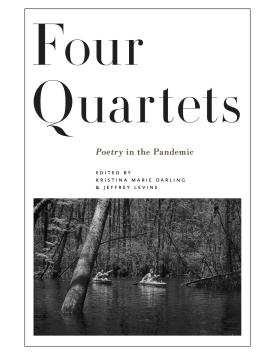 In this timely anthology, established and emerging poets bear powerful witness to the COVID-19 pandemic in writing that reels from collective grief and uncertainty. This volume consists of sixteen separate chapbooks, and a collection of pandemic-era photography, which are unified by a shared narrative: public and private experiences of quarantine, and the impulse toward creation during a time of enormous upheaval, injustice, and protest.
In this timely anthology, established and emerging poets bear powerful witness to the COVID-19 pandemic in writing that reels from collective grief and uncertainty. This volume consists of sixteen separate chapbooks, and a collection of pandemic-era photography, which are unified by a shared narrative: public and private experiences of quarantine, and the impulse toward creation during a time of enormous upheaval, injustice, and protest.
Each voice brings with it a deeply personal account of this globally historic moment, and in doing so, conveys the urgency of introspection, of isolation, and of revolution.
These pieces feature B. A. Van Sise, Jimmy Santiago Baca, Yusef Komunyakaa, Laren McClung, Stephanie Strickland, Mary Jo Bang, Shane McCrae, Ken Chen, J. Mae Barizo, Dora Malech, Jon Davis, Lee Young-Ju, Jae Kim, Rachel Eliza Griffiths, A. Van Jordan, Maggie Queeney, Traci Brimhall, Brynn Saito, Denise Duhamel, and Rick Barot.
Kristina Marie Darling is the author of over twenty books of poetry. Her awards include two Yaddo residencies and a Hawthornden Castle Fellowship, as well as grants from the Whiting Foundation and Harvard University’s Kittredge Fund. She has twice been appointed as a Visiting Artist at the American Academy in Rome. Her poems and essays appear in The Gettysburg Review, New American Writing, The Mid-American Review, Third Coast, The Columbia Poetry Review, Verse Daily, and elsewhere.
Four Quartets: Poetry in the Pandemic
by Kristina Marie Darling & Jeffrey Levine
Publisher: Tupelo Press (November 25, 2020)
Language: English
296 pages
ISBN-10: 1946482455
ISBN-13: 978-1946482457
Paperback $25.95
Hardcover $39.95
• fleursdumal.nl magazine
More in: #Editors Choice Archiv, #More Poetry Archives, Archive C-D, Archive C-D, Archive K-L, Archive K-L
Joanna Klink‘s fifth book begins with poems of personal loss–a tree ripped out by a windstorm, a friendship broken off after decades, the nearing death of parents.
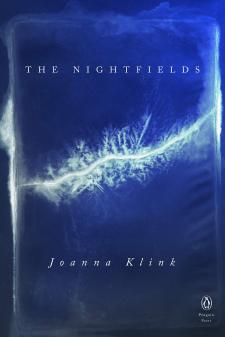 Other poems take on the cost of not loving fully, or are written from bewilderment at the accumulation of losses and at the mercilessness of having, as one ages, to rule things out. There are elegies for friends, and a group of devotional poems.
Other poems take on the cost of not loving fully, or are written from bewilderment at the accumulation of losses and at the mercilessness of having, as one ages, to rule things out. There are elegies for friends, and a group of devotional poems.
The Nightfields closes with thirty-one metaphysical poems inspired by the artist James Turrell’s Roden Crater, an extinct volcano in Arizona that Turrell has been transforming into an observatory for the perception of time. The sequence unfolds as a series of revelations that begin in psychic fear and move gradually toward the possibility of infinitude and connection.
Joanna Klink is the author of five books of poetry. She has received awards and fellowships from the Rona Jaffe Foundation, Jeannette Haien Ballard, Civitella Ranieri, the Bogliasco Foundation, the American Academy of Arts and Letters, the Trust of Amy Lowell, and the John Simon Guggenheim Memorial Foundation. She is teaching at the Michener Center in Austin. Her most recent book, The Nightfields, was published July 7, 2020 by Penguin Books.
( . . . )
When the wind pushes
branches in and out of
shade it is an opening,
as every small gesture
toward another person is
incomprehensibly alive.
Will you be part of the
stoneless passage?
( . . . )
A new collection from a poet whose books “are an amazing experience: harrowing, ravishing, essential, unstoppable” (Louise Glück)
The Nightfields
by Joanna Klink (Author)
Publisher: Penguin Books
July 7, 2020
Language: English
Paperback: 112 pages
ISBN-10: 0143135392
ISBN-13: 978-0143135395
Price: $20.00
• fleursdumal.nl magazine
More in: #Editors Choice Archiv, - Book News, - Bookstores, Archive K-L, Archive K-L
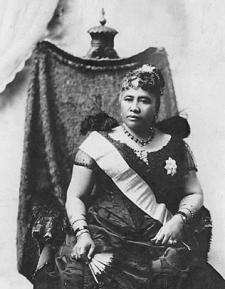
Kumulipo
(Hawaiian creation chant)
At the time that turned the heat of the earth,
At the time when the heavens turned and changed,
At the time when the light of the sun was subdued
To cause light to break forth,
At the time of the night of Makalii (winter)
Then began the slime which established the earth,
The source of deepest darkness.
Of the depth of darkness, of the depth of darkness,
Of the darkness of the sun, in the depth of night,
It is night,
So was night born
Kumulipo
O ke au i kahuli wela ka honua
O ke au i kahuli lole ka lani
O ke au i kukaiaka ka la.
E hoomalamalama i ka malama
O ke au o Makali’i ka po
O ka walewale hookumu honua ia
O ke kumu o ka lipo, i lipo ai
O ke kumu o ka Po, i po ai
O ka lipolipo, o ka lipolipo
O ka lipo o ka la, o ka lipo o ka po
Po wale hoi
Hanau ka po
Queen Liliʻuokalani
(1838-1917)
Kumulipo
Hawaiian creation chant
• fleursdumal.nl magazine
Queen Liliʻuokalani was born on September 2, 1838 in Honolulu, Hawaii, as Lydia Kamakaeha. She was proclaimed queen in 1891. The last monarch of Hawaii, her reign was short-lived due to a U. S. military-backed coup in 1893.
More in: # Classic Poetry Archive, Archive K-L, Archive K-L
This National Book Award-winning debut poetry collection is a “powerfully evocative” (The New York Review of Books) meditation on the black female figure through time.
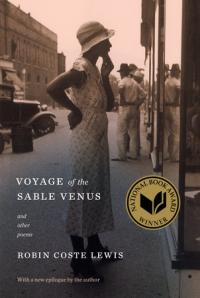 Robin Coste Lewis’s electrifying collection is a triptych that begins and ends with lyric poems meditating on the roles desire and race play in the construction of the self.
Robin Coste Lewis’s electrifying collection is a triptych that begins and ends with lyric poems meditating on the roles desire and race play in the construction of the self.
In the center of the collection is the title poem, “Voyage of the Sable Venus,” an amazing narrative made up entirely of titles of artworks from ancient times to the present—titles that feature or in some way comment on the black female figure in Western art. Bracketed by Lewis’s own autobiographical poems, “Voyage” is a tender and shocking meditation on the fragmentary mysteries of stereotype, juxtaposing our names for things with what we actually see and know.
A new understanding of biography and the self, this collection questions just where, historically, do ideas about the black female figure truly begin—five hundred years ago, five thousand, or even longer? And what role did art play in this ancient, often heinous story? Here we meet a poet who adores her culture and the beauty to be found within it. Yet she is also a cultural critic alert to the nuances of race and desire—how they define us all, including her own sometimes painful history.
Lewis’s book is a thrilling aesthetic anthem to the complexity of race—a full embrace of its pleasure and horror, in equal parts.
” To keep you happy, I decorated the bars.
Because you had never been hungry, I knew
I could tell you the black side
of my family owned slaves.
I realize this is perhaps
the one reason why I love you,
( . . . . . ) “
Robin Coste Lewis is the author of Voyage of the Sable Venus (2015), a finalist for the National Book Award. Her work has appeared in various journals and anthologies, including The Massachusetts Review, Callaloo, The Harvard Gay & Lesbian Review, Transition, and VIDA.
Lewis earned her BA from Hampshire College, her MFA from NYU’s Creative Writing Program, and an MTS degree in Sanskrit and comparative religious literature from Harvard Divinity School. A Cave Canem fellow, a Los Angeles Institute of the Humanities fellow, Lewis was also awarded a Provost’s fellowship in the Creative Writing & Literature PhD Program at USC. Other fellowships and awards include the Caldera Foundation, the Ragdale Foundation, the Headlands Center for the Arts, and the Summer Literary Seminars in Kenya. She was a finalist for the International War Poetry Prize, the National Rita Dove Prize, and semi-finalist for the “Discovery”/Boston Review Prize and the Crab Orchard Series Open Poetry Prize.
Lewis has taught at Wheaton College, Hunter College, Hampshire College and the NYU Low-Residency MFA in Paris. Born in Compton, California, her family is from New Orleans.
Voyage of the Sable Venus
and Other Poems
by Robin Coste Lewis
Category: Poetry
Paperback
$19.95
2017
ISBN 9781101911204
Publisher : Knopf (1st edition 2015)
Language : English
160 pages
ISBN-10 : 1101875437
ISBN-13 : 978-1101875438
• fleursdumal.nl magazine
More in: #Editors Choice Archiv, Archive K-L
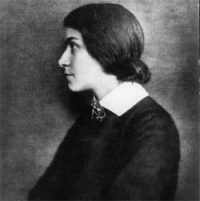
Mein blaues Klavier
Ich habe zu Hause ein blaues Klavier
Und kenne doch keine Note.
Es steht im Dunkel der Kellertür,
Seitdem die Welt verrohte.
Es spielten Sternenhände vier
-Die Mondfrau sang im Boote-
Nun tanzen die Ratten im Geklirr.
Zerbrochen ist die Klaviatür…..
Ich beweine die blaue Tote.
Ach liebe Engel öffnet mir
-Ich aß vom bitteren Brote-
Mir lebend schon die Himmelstür-
Auch wider dem Verbote.
Else Lasker-Schüler
(1869 – 1945)
Mein blaues Klavier
• fleursdumal.nl magazine
More in: Archive K-L, Archive K-L, Lasker-Schüler, Else
From the Number One Sunday Times bestselling author of milk and honey and the sun and her flowers comes her greatly anticipated third collection of poetry.
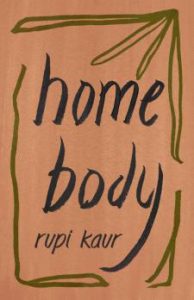
Rupi Kaur constantly embraces growth, and in home body, she walks readers through a reflective and intimate journey visiting the past, the present and the potential of the self. home body is a collection of raw, honest conversations with oneself – reminding readers to fill up on love, acceptance, community, family, and embrace change. illustrated by the author, themes of nature and nurture, light and dark, rest here.
i dive into the well of my body
and end up in another world
everything i need
already exists in me
there’s no need
to look anywhere else
– home
rupi kaur is a poet. artist. and performer. as a 21-year-old university student rupi wrote. illustrated. and self-published her first poetry collection milk and honey. next came its artistic sibling the sun and her flowers. these collections have sold over 8 million copies and have been translated into over 40 languages. home body is her third collection of poetry. rupi’s work touches on love. loss. trauma. healing. femininity. and migration. she feels most at home when creating art or performing her poetry onstage.
Rupi Kaur
Home Body
Paperback
ISBN : 9781471196720
Publisher: Simon & Schuster UK
November 17, 2020
English Poetry
$13.59
# new poetry
Rupi Kaur
Home Body
• fleursdumal.nl magazine
More in: - Book News, Archive K-L, Archive K-L, Art & Literature News, Kaur, Rupi
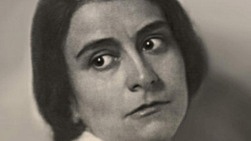
Versöhnung
Es wird ein großer Stern in meinen Schoß fallen …
Wir wollen wachen die Nacht,
In den Sprachen beten,
Die wie Harfen eingeschnitten sind.
Wir wollen uns versöhnen die Nacht –
So viel Gott strömt über.
Kinder sind unsere Herzen,
Die möchten ruhen müdesüß.
Und unsere Lippen wollen sich küssen,
Was zagst du?
Grenzt nicht mein Herz an deins –
Immer färbt dein Blut meine Wangen rot.
Wir wollen uns versöhnen die Nacht,
Wenn wir uns herzen, sterben wir nicht.
Es wird ein großer Stern in meinen Schoß fallen.
Else Lasker-Schüler
(1869 – 1945)
Versöhnung
• fleursdumal.nl magazine
More in: Archive K-L, Archive K-L, Lasker-Schüler, Else

Von weit
Dein Herz ist wie die Nacht so hell,
Ich kann es sehn
– Du denkst an mich – es bleiben alle Sterne stehn.
Und wie der Mond von Gold dein Leib
Dahin so schnell
Von weit er scheint.
Else Lasker-Schüler
(1869 – 1945)
Von weit
• fleursdumal.nl magazine
More in: Archive K-L, Archive K-L, Lasker-Schüler, Else

Als der blaue Reiter war gefallen …
Griffen unsere Hände sich wie Ringe;-
Küßten uns wie Brüder auf den Mund.
Harfen wurden unsere Augen,
Als sie weinten: Himmlisches Konzert.
Nun sind unsere Herzen Waisenengel.
Seine tiefgekränkte Gottheit
Ist erloschen in dem Bilde: Tierschicksale.
Else Lasker-Schüler
(1869 – 1945)
Als der blaue Reiter war gefallen . . .
(Nachruf von Else Lasker-Schüler an den 1916
im 1.Weltkrieg gefallenen Franz Marc)
• fleursdumal.nl magazine
More in: *War Poetry Archive, Archive K-L, Archive K-L, Lasker-Schüler, Else
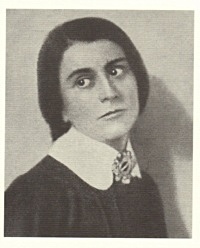
Weltende
Es ist ein Weinen in der Welt,
Als ob der liebe Gott gestorben wär,
Und der bleierne Schatten, der niederfällt,
Lastet grabesschwer.
Komm, wir wollen uns näher verbergen …
Das Leben liegt in aller Herzen
Wie in Särgen.
Du, wir wollen uns tief küssen –
Es pocht eine Sehnsucht an die Welt,
An der wir sterben müssen.
Else Lasker-Schüler
(1869 – 1945)
Weltende
• fleursdumal.nl magazine
More in: Archive K-L, Archive K-L, Lasker-Schüler, Else
Thank you for reading Fleurs du Mal - magazine for art & literature